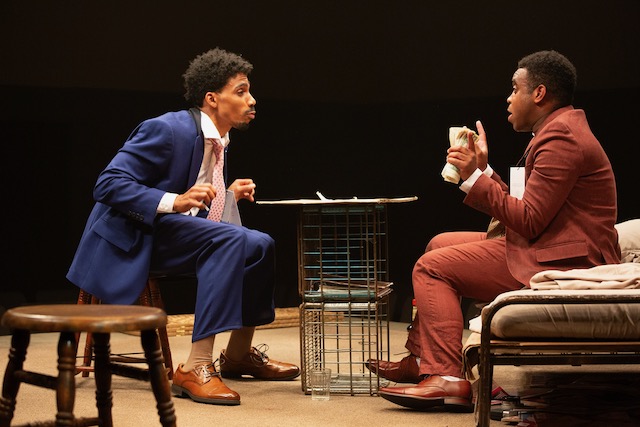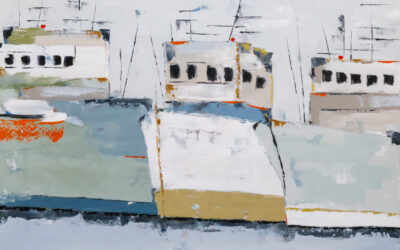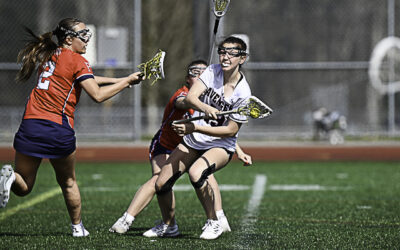Above: From left, Anthony T. Goss (Lincoln) and Marc Pierre (Booth). Photo by Cat Laine
The Gamm Theatre kicks off its 39th season with Suzan-Lori Parks’ 2002 Pulitzer Prize-winning play, Topdog/Underdog, a two-man play about brotherly love, competition and pride under the yoke of economic struggle. It’s a hard-edged, heavily metaphorical play about how our greed turns us against each other, and we reap precisely what we sow,
Parks was the first African-American woman to win a Pulitzer for her story about Lincoln and Booth, older and younger brothers, respectively, named by their dad as a joke, who soon followed his wife out the door. The abandoned siblings share a boarding house room after Lincoln’s girl Cookie kicked him out.
Lincoln is a former hustler gone legit, now working in an arcade as an Abraham Lincoln impersonator folks pretend to shoot. Booth has no interest in straight work, mostly just sitting around the room, practicing to follow in his brother’s footsteps as a three-card-monte dealer.
Much like the Arctic Playhouse’s manic adaptation of The 39 Steps last season, Topdog/Underdog’s two-character setup is a theatrical trope that was quite popular for a decade or two but which you don’t see written (or even performed) that often, for reasons that aren’t entirely clear beyond fashion. Edward Albee’s Zoo Story is the exemplar of this type of play, where the two actors circle each other looking for the upper hand and often some kind of recompense for their suffering at the hands of others or the opposing character, before a late change up casts the battle in a new light.
In this case, there is an added level of natural conflict as brothers that’s deepened by their endemic, and seemingly indefatigable poverty, which is naturally deepened by the sometimes feckless decisions one makes under the influence of alcohol and/or deprivation.
Sibling rivalry often clouds their bond, and midway through the play we discover their mom had a weekday lover which even calls their paternal kinship into question. In a clever touch, the show is performed with the audience on all sides of a square ring, where Lincoln and Booth duke out, literally to take one another’s meager inheritance.
The play examines trying to work within a broken system or trying to beat it, but mostly suggests those at the bottom like these two are already lost. That sort of implicit outlook is difficult because that suggests there is nowhere for the protagonist to go, no way for them to win, but it’s more like that there are no protagonists in this kind of an economic construct, just a lot of ill-fitting pieces. Dramatically the audience is sort of challenged to be hopeful and care about two characters who may already be damned.
Both actors acquit themselves excellently, though Anthony Goss (Lincoln) has an easier role as the top dog whose setback initially feels temporary until we discover what role Marc Pierre (Booth) may have played in Lincoln’s troubles.
As you might imagine, the single room is a cauldron cooking with perceived injustices and entitlements that set them at odds. However the first act didn’t fully click in part because the two characters’ role reversals weren’t crisp enough to cleanly delineate what each other wants with each other. As their sibling bond was examined and pulled apart, pace lagged, and it felt more like badminton than tennis.
Such two-person pieces rely heavily on the characters trading control of the stage but Goss’ Lincoln controls the floor for much of the first act, and it diminishes the tension from building as smoothly as it does in the second act.
If there were some doubts at the end of the first act, the second act alleviated them. Once the stakes get high and Pierre starts to lean into Booth’s mental state, tension builds quickly. In the second act, Booth’s obvious weakness suddenly grows more menacing. That menace probably needs to be more overt earlier. By the last act, the game is on, and it’s a nasty one indeed.
There are definitely moments of levity but mostly this is a searing indictment of a system that sets its most precariously positioned inhabitants against each other for a fractional piece of cheese, rather than share the immense largesse accumulated by the comfortable of the world’s richest country,
The Gamm’s sharp production is a reminder that just because freedom rings doesn’t mean you’re free.
Topdog/Underdog, by Suzan-Lori Parks, directed by Cliff Odle, runs now-Oct. 1 at The Gamm Theatre, 1245 Jefferson Blvd., Warwick, R.I. Tickets: 401-723-4266 or gammtheatre.org/topdog $55-$65; Student $20; Rush $30; Pay-What-You-Wish Fridays; Discounts for groups of 10; Additional discounts at gammtheatre.org/discounts.
Chris Parker is a freelance journalist (The Guardian, Undark, Daily Beast, Billboard) and author of the book, King James Brings The Land a Crown, about the Cleveland Cavaliers’ 2016 championship. He lives in Providence.






 Subscribe
Subscribe